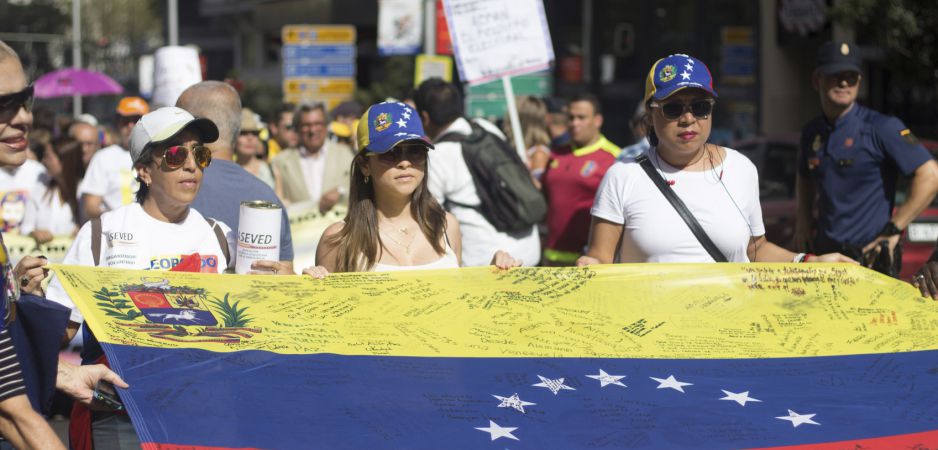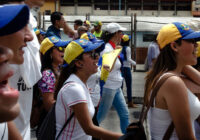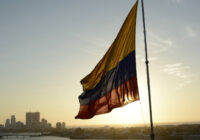National surveys show the economic crisis and food shortages have taken their toll on the quality of life for Venezuelans.
In Venezuela, more than half a million people marched on September 1 to protest against the government, calling on the electoral authority to approve a recall referendum against President Nicolas Maduro.
“In light of these objectives, amply fulfilled, I declare that the ‘taking of Caracas’ was a resounding success, marking the time of a struggle that starts now,” said Jesús Torrealba, secretary of the opposition Democratic Unity Roundtable (MUD).
Opposition supporters have expressed their disagreement with government policies and said that they felt “anger” because of the difficult situation Venezuelans currently face. Food shortages exceed 80% and more than half of the population claim to have gone to bed hungry, according to several national polls.
The MUD has devised new methods of protesting and called on citizens to participate in a “National Cacerolazo” at 8:00pm and pound kitchen pots outside their homes. Opponents stood in the streets for 10 minutes on September 7, and another demonstration is expected on September 14. Once enough support has been generated, Torrealba said, “we will call [everyone to take part in] ‘the taking of Venezuela’ for 24 hours straight, demanding the recall referendum.”
Parallel to the opposition protest in eastern Caracas, the Chavismo movement was concentrated in the west of the capital. Maduro spoke to his crowd of supporters, visibly smaller than the opposition’s, and said: “If you see them do something against President Maduro, take to the streets in a civilian-military union and make the most radical revolution … Today, we defeated an attempted coup that sought to fill with deaths this beautiful Caracas.”
In his speech, the Venezuelan president announced that he would request an override of “parliamentary immunity of the opposition’s elected National Assembly members.” Days earlier, Maduro said he would file a lawsuit against opposition member Henry Ramos, the president of the National Assembly, for his “racist and violent speech.”
Three days later, on September 3, Maduro traveled to the island of Margarita, one Venezuela’s top tourist locations, and visited the Villa Rosa, a traditionally Chavista community. He toured the area without his security cordon, and a group of people pounded their kitchen pots to protest, and some even approached the president to push him. Maduro fled the place running. The government made no official statement about the incident, but a spokesman claimed it was an opposition montage, referring to a video that later went viral. Five people were arrested.
Political analysts agree that Maduro has radicalized his speech and become more aggressive with the opposition. Before the “taking of Caracas,” nine opposition leaders were arrested or transferred to prison for allegedly being involved in acts of destabilizing Venezuela. Most of them are members of Voluntad Popular, the party of political prisoner Leopoldo López.
On September 5, the Supreme Court declared null all acts of the Venezuelan parliament for the swearing in of three members of the opposition, who had been suspended by the court. The assembly was declared unfit to legislate.
Polls favor the opposition
Between February and June 2016, the support for a recall referendum increased from 40% to 58%, according to a poll by Venebarómetro, one of the biggest pollsters in Venezuela. The study concluded that more than 10 million voters would vote against the president, and this number exceeds the required number of signatures needed to carry out a recall referendum.
The discontent in popular neighborhoods also seems to affect the popularity of the president. In a national survey by Datincorp, 57% of inhabitants in shanty towns said they want Maduro to leave the government.
The opposition has accused the National Electoral Council (CNE), which is responsible for conducting the elections, of violating internal regulations and delaying the process. It is still unknown whether the recall referendum will be held this year or next. If it is carried out in 2017, Vice President Aristóbulo Istúriz would assume the presidency instead of an election being held. However, the electorate is willing to vote on both dates, according Datincorp’s study.
Opposition has the ball
“What matters now, what is now different from the past, is that polls show that the opposition is the majority. And the size of this mobilization (the taking of Caracas) shows that now the opposition is able to stay in the street,” says Luis Vicente León, director of the Datanálisis national consultancy, in an article published by Prodavinci a day after the march.
“Although it advances slowly, the recall referendum is leaving sequels that are increasingly determinants. It’s like a snowball that grows over time. The march of September 1 seems to reflect a point of no return, and what happened at Villa Rosa shows an effect of that snowball, that it is already reaching the lower strata,” writes political analyst Michael Penfold.
Both León and Penfold agree that the “taking of Caracas” was a victory for members of the opposition because they showed their political muscle and their power of mobilization.
 Fair Observer provides you deep and diverse insights for free. Remember that we still have to pay for servers, website maintenance and much more. So, donate now to keep us free, fair and independent.
Fair Observer provides you deep and diverse insights for free. Remember that we still have to pay for servers, website maintenance and much more. So, donate now to keep us free, fair and independent.
“Well, the opposition needs to keep pressure on the central objective: the fulfillment of constitutional rights. Today the issue is not size: the opposition majority is something we already knew. It is time to use [the] peaceful pressure … that began today. The key is to understand how it is maintained,” says León.
What will the Chavismo do? Penfold responds in his article by saying: “Once the opposition has collected 20% in October, President Maduro will bet on an abstention. He will try to convince his own [base] that he can prevent the opposition getting enough votes to recall him. But Chavismo looks exhausted after a futile resistance, and it is very likely they abandon him publicly.”
The CNE has already said that a recall referendum will be held between the October 24 and 30, but it has not announced a final date.
Political analyst Alberto Aranguibel differs with León and Penfold. In a conversation with Fair Observer, he says that on September 1 “the winner was Venezuela … It showed that there is full political freedom, a proper performance of democracy, and there is no risk of persecution against the opposition political leadership.”
Despite the projection, Venezuela’s political future remains uncertain. One question that remains unanswered is what will happen if parliamentary immunity is removed. How will the opposition react to this? What will the government do? Will the president of the assembly go to prison?
It seems that the battle for the recall referendum will take more than a few months.
The views expressed in this article are the author’s own and do not necessarily reflect Fair Observer’s editorial policy.
Photo Credit: Carlos Duro Yagüe
Support Fair Observer
We rely on your support for our independence, diversity and quality.
For more than 10 years, Fair Observer has been free, fair and independent. No billionaire owns us, no advertisers control us. We are a reader-supported nonprofit. Unlike many other publications, we keep our content free for readers regardless of where they live or whether they can afford to pay. We have no paywalls and no ads.
In the post-truth era of fake news, echo chambers and filter bubbles, we publish a plurality of perspectives from around the world. Anyone can publish with us, but everyone goes through a rigorous editorial process. So, you get fact-checked, well-reasoned content instead of noise.
We publish 2,500+ voices from 90+ countries. We also conduct education and training programs
on subjects ranging from digital media and journalism to writing and critical thinking. This
doesn’t come cheap. Servers, editors, trainers and web developers cost
money.
Please consider supporting us on a regular basis as a recurring donor or a
sustaining member.
Will you support FO’s journalism?
We rely on your support for our independence, diversity and quality.






